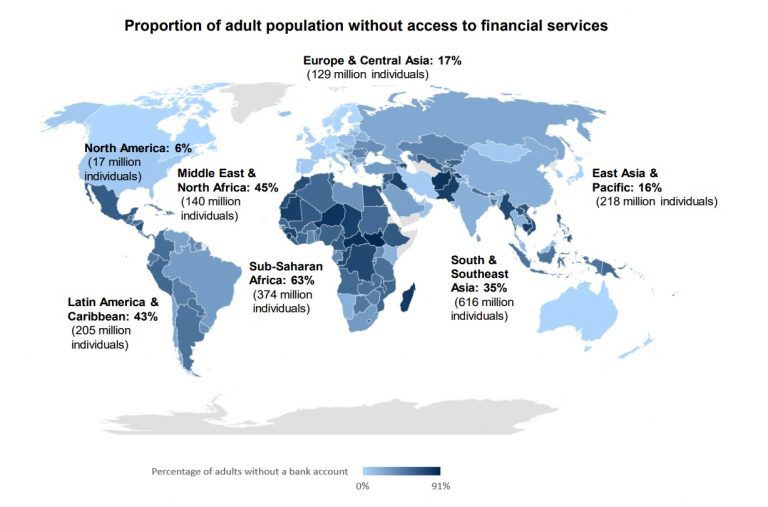
The world has made huge strides in overcoming global poverty. Since 1990, more than 1.2 billion people have risen out of extreme poverty. In 2019, 9.2% of the world survived on $1.90 a day or less, compared to nearly 36% in 1990.
The pandemic however threatens to reverse decades of progress in the fight against global poverty and income inequalities. While the full impact of the COVID-19 pandemic is unknown, the World Bank estimates that an additional 88 million to 115 million people will fall into extreme poverty in 2020, with the total rising to as many as 150 million by 2021.
However, the focus of my blog is to shed light on solutions rather than highlighting problems.
Through the course of the last five years we have seen the development of bitcoin technology and cryptocurrencies that are providing the world with avenues for technological progress in the realm of poverty alleviation. Crypto sometimes gets a bad rap, for its use of illicit internet purchases, millennial millionaires, and wild volatility. Furthermore, aid organisations in Africa, South East Asia, and India, and have seen the lack of literacy, lack of electricity, and lack of connectivity that would make a digital currency nearly unusable. In Africa, for example, 65% don’t even have internet access.
However, let’s try to keep our focus on the bright side of the moon here. In 2018 Coinbase co-founder and CEO, Brian Armstrong, announced a call to action for the crypto community to use its resources to do good: he launched a new charity, GiveCrypto.org, with the goal of sending crypto to people in need.
So let us try to understand how charities like GiveCrypto could empower the poor through peer-to-peer online payments without use of financial intermediaries.
- Sending aid without corruption
Firstly, an additional infrastructure that would provide a way to send coins to the right people, and cash out coins in exchange for goods would need to be developed by on the ground organisations. For example, in 2017 the World Food Program supported more than 10,000 Syrian refugees with digital currency vouchers to trade at selected markets in Jordan, successfully transferring $1.4M.
CryptoCoins could be immediately used by people in crisis situations as large scale corruption by governments, on-the-ground providers, and even nonprofits prevents large amounts of aid from reaching the end recipients. GiveCrypto could ensure that those in volatile situations get resources directly, by eliminating the need to send aid money through intermediaries. This would also mitigate time inefficiencies caused by having to track receipts.
Blockchain technology platform’s information and transactions are a lot more secure. On the macroeconomic scale, people can channel taxes, loans and funds a lot more efficiently. This can also help improve accountability and transparency of important government funds.
Globally, many countries have inculcated a number of blockchain projects in the health care and education sectors. As a result, governments can take the opportunity to allocate funds to different sectors of the economy and perhaps even extend it to providing development aid and funding to improve social welfare, infrastructure and other services. Likewise, due to transparency, it is also easier to provide underprivileged people with insurance . For instance, Copenhagen based SPACE10 is working on a project that seeks to combine blockchain technology and solar power as centralised sources are often not economically and cost viable.
2. Providing people with an economic identity
Financial inclusion is an imperative U.N. Sustainable Goal and The World Bank’s latest global report on financial exclusion estimates that 1.7 billion adults around the world have no access to financial services.

These 1.7 Billion adults usually blame fees, distance to banks, lack of unnecessary documentation, and most commonly not having enough assets to create a bank account. Crypto could efficiently tackle this problem as it only requires a digital wallet.
Blockchain technology can act as a central banking system especially due to its decentralised nature. It can help cut down on remittance fees because traditional banking systems usually tend to charge high transaction costs. These fees account for nearly $4.32 billion among south Asian countries. In countries like India with a significant expat and migrant population living overseas, blockchain technology could play a massive role in transferring funds back home.
This will also make it easier to secure property rights and undertake secure investments as buyers and sellers will be able to interact in a secure environment where they will be provided with a digital reputation profile as well as a digital record of transactions.
With more financial inclusion, we can also logically deduce that consumers will also have greater opportunities to engage in micro-transactions in the form of lending, as well as trading due to minimal interest rates on loans. This will also improve the chances of setting up businesses and enterprises which are the key to economic growth in developing economies.
3. Blockchain and Farming
Although blockchain alone does not have the power to massively increase profits for farmers, it does provide a digital infrastructure that facilitates tracking and automation. In the case of farming, blockchain not only records transaction ledgers but also lists data such as soil moisture, seed quality, demand, sale date and more. This clarity and immediate access to information allow farmers to market themselves and sell crops for their actual worth rather than a lower cost. By eliminating the need for a middleman, blockchain has the potential to connect farmers directly to consumers and retailers.
4. Stability in inflation riddled developing economies
For many people in emerging economies, long term savings are challenging due to high inflation. While cryptocurrency may remain volatile, it can help people in countries with hyperinflation like Venezuela where they experienced a rise by 5000% in inflation in 2017 and 600% South Sudan 2016.
Projects like stablecoins are trying to create a more stable cryptocurrency to actually give people the opportunity to increase savings through crypto without huge risks.
Fiat-collateralized stablecoins maintain a fiat currency reserve, like the U.S. dollar, as collateral to issue a corresponding number of coins, Other forms of collateral can include precious metals like gold or silver, as well as commodities like oil, but most of the present-day fiat-collateralized stablecoins use dollar reserves.
Such reserves are maintained by independent custodians and are regularly audited for adherence to the necessary compliance. Tether (USDT) and TrueUSD are popular crypto coins that have a value equivalent to that of a single U.S. dollar and are backed by dollar deposits.
Conclusion
The crypto philanthropic world has been evolving rapidly but there are still quite a few pieces of the puzzle that will need to be put together in order to make this work. Some of these pieces include the following
- providing sufficient training to donors and gift receivers
- Create tools to receive crypto and transact in emerging markets.Since a majority of the world does not own smartphones or computers, companies like CoinText.io are developing technology which allows users to send BCH and other tokens like DASH through a text message
Crypto has already begun unlocking new opportunities in philanthropy. Charity Coins like Clean Water Coin, CareBit have been launched to drive donations for noble causes. Honu, and this is my personal favourite, launched an to auction help endangered turtles.
Blockchain more broadly has a massive potential to increase transparency in the nonprofit sector. It will be very interesting to see how these developments in financial technology will provide the world economy with added firepower against poverty and inequality in the uncertain years to come.
Reach us for Web design | App Design | Domain, Hosting, Email, Devops | Marketing collaterals | Digital Marketing
For more details reach us at [email protected]
